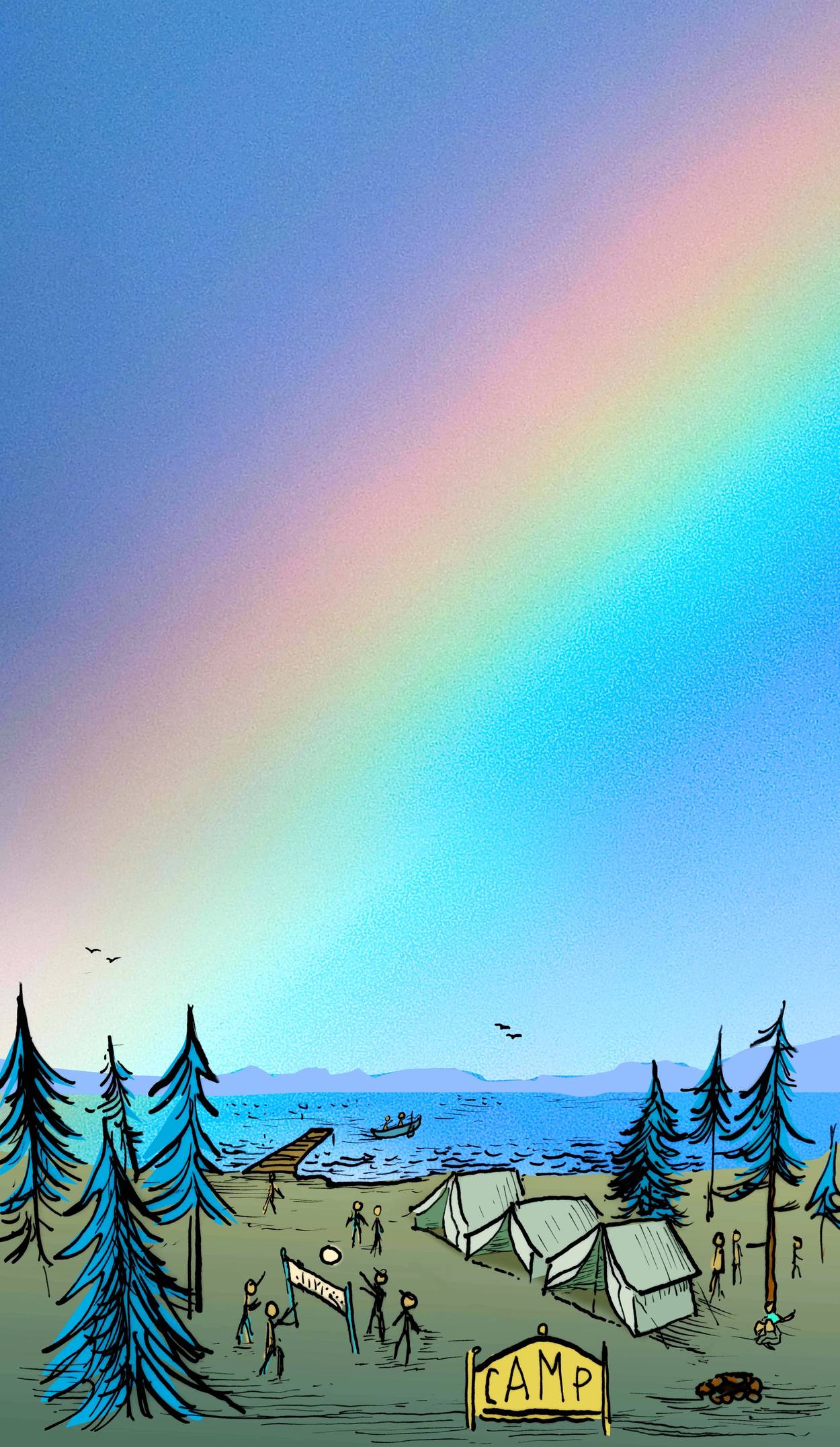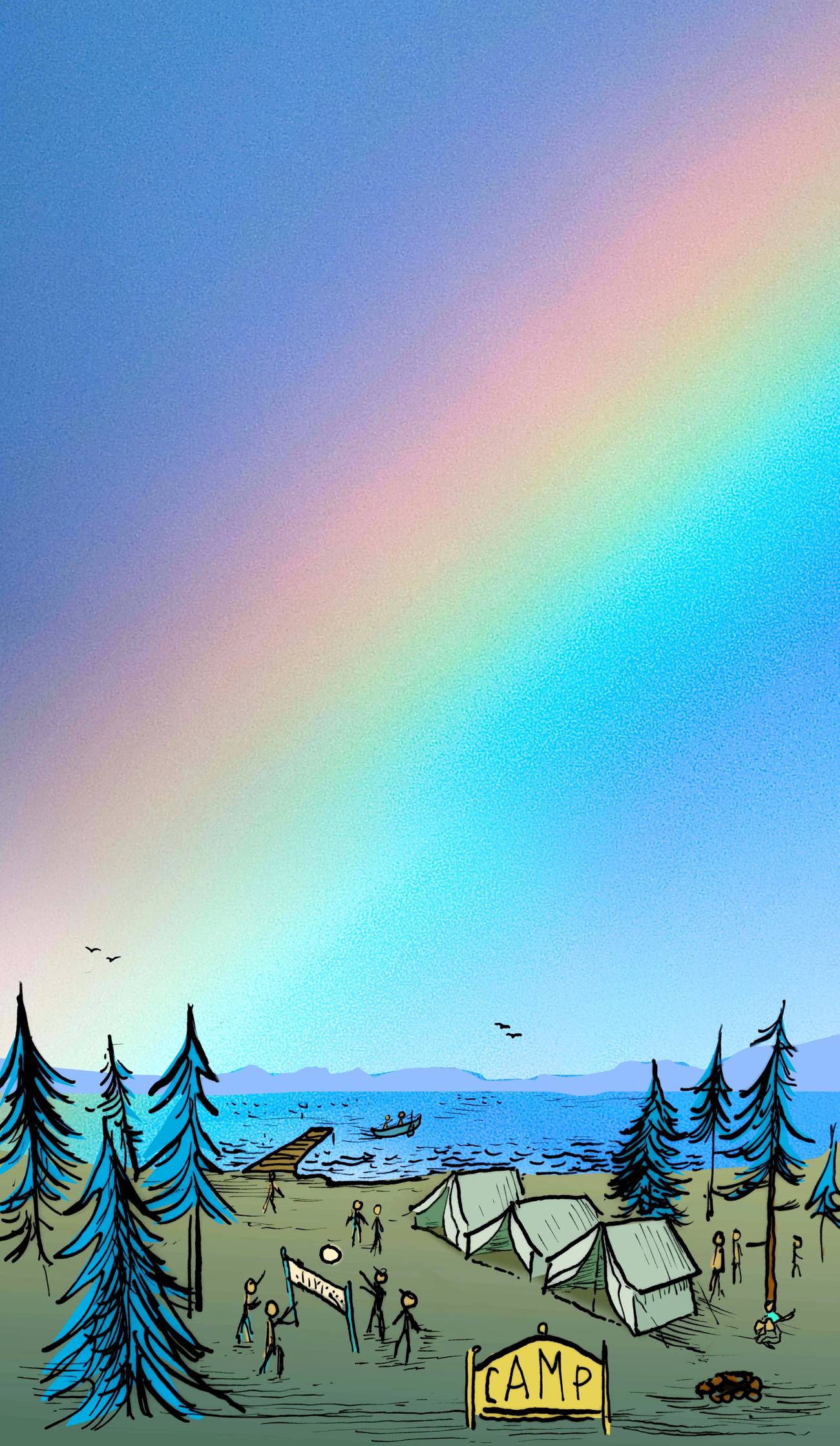No Home Away From Home
For queer kids, summer without camp can be particularly tough




Summer camps are laboratories for the dream world. Historically, Jewish camps have pursued many dreams: Give urban kids an escape, make Jewish immigrants more American, make assimilated Americans more Jewish, teach young Jews about the various denominations and flavors of Zionism. But camp’s real, lasting impact is often entirely different from these Fate of Our People aspirations.
Jewish camp has earned a reputation as a bacchanalian, hyperstraight, multiweek, sexual decathlon. A place where kids make out on the bus to field trips, sneak out to meet first crushes, and lose their virginity to tanned Israeli scouts. The cult classic Wet Hot American Summer both takes place at and aptly describes many Jewish camps. Camp Ramah, verging on self-parody, has its own Jdate spinoff. As the writer Emily Shire put it, “Hooking up at camp is a hallmark of the American Jewish youth experience.”
Social distancing is the exact opposite of all this. Coronavirus has meant that the more than 80,000 Jewish campers across the country might not get together and, you know, get together, this summer.
The loss is deepest for queer campers. Far from home, school, parents, and their attendant assumptions, camp is often a safe space—sometimes the only safe space—for them to ask who they are and what they like, where they won’t be judged for the answers. A lost summer is a profound blow.
Even though Kian Rank didn’t come out as nonbinary and transgender until afterward, they got their first taste of true queer intimacy as a camper and counselor at a nondenominational, primarily Jewish camp in Maine. “I became really close to my friends there, both physically and emotionally, in a way that didn’t feel possible back at home,” said Rank. “Camp is where I 100% let go and felt totally safe.”
They lay for hours with friends on the field, doing nothing but savoring each other’s company. Rank had their first boyfriend at camp, and their first kisses with women, too. They’d all play a game where one would eat a jelly bean, and the others would make out with them until they could guess the flavor.
“Of course it turned out all my friends from camp are queer. We didn’t maybe have the words to describe it at the time,” Rank said.
Noah Spaulding-Schecter, who grew up going to URJ Goldman Union Camp Institute (GUCI) in Indiana, said it never mattered at camp that he was gay. He was free to gossip, cuddle, or hug with whomever and no one thought twice about it. “On top of being gay and Jewish, I’m also Asian, so in certain areas I didn’t feel comfortable with one part of me, in certain areas I didn’t feel comfortable with the other part, but there was something about GUCI in particular,” he said. “I kind of just forgot about that.”
“Everyone at camp is a little bit gay,” he added with a laugh.
This is the thesis of a growing body of writing about summer camp, which posits the whole camp enterprise is essentially queer. The authors of 2019’s Queer as Camp: Essays on Summer, Style, and Sexuality argue that camp, with its campy sensibilities and dress up, its intimate cabins and place outside the mainstream, encourages “queer encounter and formation,” which “permits intimate contact that always risks shifting into the sexual.”
For Frankie Sandmel, who is genderqueer, being at an all-girls camp with uniforms offered a place of revelatory uniformity. “As a queer, genderqueer person, the fact that there were no cisgender dudes around, and we were all wearing mesh shorts and T-shirts, I felt really empowered to actually be who I was without having to define myself in relation to gender all the time,” Sandmel said.
For Sam Rubin, a longtime camper and now staffer at Northern California’s Camp Tawonga, who is gay, Jewish camp’s signature atmosphere of ruach (spirit) and openness, especially from his counselors, was inspiring. “They were just people who were proud to be themselves, and I saw that, and I could internalize that and know, ‘Oh I can be proud to be myself,’” he said.
Even for straight kids like me, camp—in my case, URJ Camp Newman in California—was a liberated place, where the usual lines and labels around sexuality hardly mattered. The first man and woman I kissed were both camp people. I crammed three or four boys deep into showers with my bunkmates.
This doesn’t mean that kids, left alone, don’t reproduce some of the usual regimes around intimacy, gender, and sexuality that cause so many to suffer. Camp culture, in too many places, remains often overwhelmingly, explicitly straight. All the fooling around can have a cruel punchline: It’s OK because we’re not actually gay. It’s just camp stuff. Camp may be a dream world, but it can still inherit the prejudices of the world we have.
Noah Westreich, who is training to be a rabbi, didn’t come out until later, but he still intuited he wasn’t quite welcome at Cedar Lake, a New Jersey YMHA camp. He found it easier to befriend the girls. In camp’s fratty culture, that made him suspect. Once, his counselor gave the cabin a lesson on how being a “pimp” like Westreich was “the ultimate goal”: “You just treat them like they’re your friend,” the counselor said, “‘but really you know you’re a pimp and you’re going to get all the ladies.”
“That was really embarrassing and humiliating and wrong,” Westreich told me.
While other male campers messed around or streaked, Westreich retreated. “I just became very reserved and kept to myself after I sort of started realizing that I was different,” he said. “I would choose to go to bed early, turn my head because I never wanted to be caught looking.”
Others, like Sandmel, note that with all the focus on guy-girl couples, queerness—especially nonmale queerness—rarely gets acknowledgement in Jewish camp’s culture of summer loving, which is why they kept their feelings a secret until they were a counselor.
Still, there’s a growing movement across the country seeking to build on Jewish camp’s history as a special, albeit imperfect, place for queer campers, whether that’s opening up all-gender cabins, retraining staff, creating specifically LGBTQ Jewish camps, or doing new types of programming, such as Camp Tawonga’s queer campfire. But despite the recent momentum, queer campers will have to wait until next summer to enjoy it.
“It’s really tough not to have this. For some kids, it’s the one time in the whole year when you’re away from your family, you’re with people your age, in a community of lots of young people who are committed to you,” said Rubin. “Even if you know your family will be accepting, it’s still difficult to really explore and come to terms with that at home.”
Josh Marcus writes about politics, identity, the environment, and California.